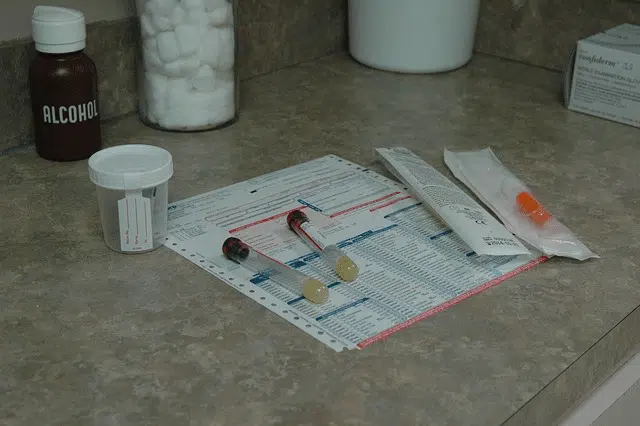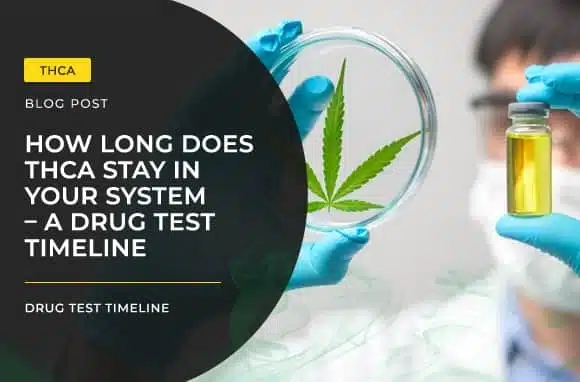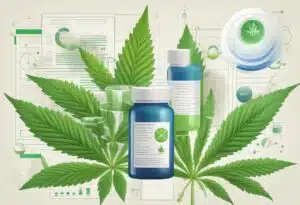Are you worried about THCA showing up on your drug test? Despite its potential therapeutic benefits, many people are concerned about the legal status of THCA and “how long does THCA stay in your system.” Let’s shed light on the intricacies of THCA, its properties, how it interacts with drug tests, and tips on removing it from your system.
Key Takeaways
THCA is the non-psychoactive precursor to THC and can be converted into it through decarboxylation.
Factors such as consumption method, frequency of use, and individual metabolism affect THCA detection in drug tests.
Abstaining from THCA products, exercising regularly, staying hydrated, and maintaining a balanced diet are effective ways to remove it from your system.
Understanding THCA and Its Properties

THCA, otherwise known as tetrahydrocannabinolic acid, is a non-psychoactive cannabinoid. It can be found in cannabis and hemp plants. Unlike its well-known cousin, THC, THCA does not have any intoxicating effects. However, heat exposure can trigger a conversion of THCA to THC, which may offer potential therapeutic benefits. With the increasing popularity of raw cannabis and THCA products, many wonder how long THCA stays in their system and whether it can cause a positive drug test.
Understanding THCA’s role in drug tests requires distinguishing it from THC and exploring its potential therapeutic benefits.
THCA vs. THC
While both THCA and THC originate from the cannabis plant, their effects on the body are quite different.
THCA is the precursor to THC and does not bind to CB1 receptors, meaning it does not produce psychoactive effects unless heated.
With heat exposure, THCA undergoes decarboxylation, converting into the psychoactive compound Delta 9 THC.
This conversion is why consuming heated THCA products, such as those obtained through smoking or ingesting, can produce a positive result in standard drug tests.
In contrast, psychoactive THC is the primary compound in cannabis, responsible for the intoxicating effects often associated with marijuana use. Since most drug tests screen for THC metabolites, consuming unheated THCA products can still result in a positive drug test due to trace amounts of THC and the detection of the THC metabolite.
It’s vital to be aware of the differences between THCA and THC when evaluating their potential impact on drug tests and their legal status.
Potential Therapeutic Benefits
Despite its non-psychoactive properties, THCA has shown potential health benefits worth exploring. Research has demonstrated that THCA possesses anti-inflammatory properties, which may be beneficial in managing various conditions. Additionally, THCA has been found to have neuroprotective effects, potentially aiding in treating neurological disorders.
Other potential therapeutic benefits of THCA include anti-emetic properties, antioxidant activity, and pain relief. However, more research is required to comprehend these potential benefits’ scope and efficacy fully.
As the science behind THCA continues to evolve, so will our understanding of its role in health and wellness.
Factors Affecting THCA Detection in Drug Tests

Various factors, including the method of consumption, how often you use it, and your metabolism, can influence THCA detection in drug tests. Understanding these factors can help you make informed decisions about consuming THCA products and better predict the outcome of drug tests.
Consumption Methods
The method of consumption plays a significant role in THCA detection in drug tests. Common methods of consuming THCA include:
Smoking
Vaping
Dabbing
Ingesting edibles or tinctures
Each method impacts the rate at which the body processes THCA, affecting its detectability in drug tests.
For example, consuming heated THCA products derived from a marijuana plant by smoking or ingesting them increases the probability of failing a drug test compared to consuming raw THCA, as the heat converts THCA into THC, which is more easily detectable.
Frequency of Use
The frequency of THCA use can also influence its detectability in drug tests. It has been observed that THCA may remain detectable in the body for only a couple of days when used infrequently. In contrast, prolonged daily use over several weeks may extend the period of elimination of THC-COOH, the metabolite that drug tests detect, making it more likely to result in a positive test.
Being mindful of the frequency of THCA use and understanding the potential impact on drug test results can help you make better choices when consuming THCA products.
Individual Metabolism
Individual metabolism rates can significantly impact the efficiency of THC-COOH breakdown and elimination. Factors such as:
Age
Biological sex
Water and body fat percentage and distribution
Level of physical activity
Overall metabolism
Types of Drug Tests and Their Sensitivity to THCA

Various drug tests exist, each with different sensitivities to THCA. The different types of drug tests include:
Urine Tests
Urine tests, also known as urine drug screens, are among the most common types of drug tests, primarily due to their non-invasive nature and relative ease of administration. The detection window of THC metabolites in urine tests may vary depending on the individual and the frequency of use, ranging from several days to over a month.
Although urine tests are less sensitive than other drug tests, they can still detect THCA. Considering these factors is crucial when anticipating urine testing results.
Saliva Tests
Saliva tests have gained popularity due to their convenience and accuracy. They offer a higher sensitivity than urine tests and can detect THCA. The benefits of saliva tests for THCA detection include their practicality, precision, and brief detection window.
However, their drawbacks include the possibility of contamination and the brief detection window, which may not accurately reflect the individual’s overall THCA consumption.
Blood Tests
Blood tests are the most sensitive drug tests and can accurately detect THCA. They can detect THC metabolites for 3-7 days but are invasive and less commonly utilized. Blood tests necessitate a blood sample to be extracted, making them highly invasive compared to other drug test types.
While blood tests offer the most accurate detection of THCA, their invasiveness makes them less appealing to many individuals.
Hair Follicle Tests

Hair follicle tests can detect THC up to 90 days after consumption but may not work for recent or light use. Hair follicle tests are the least sensitive among all drug tests and may not accurately reflect an individual’s overall THCA consumption.
How to Remove THCA from Your System

If you are concerned about THCA detection in drug tests, there are several steps you can take to help remove it from your system. These include:
Abstinence
Abstaining from THCA products is the most effective way to avoid detection in drug tests. This entails avoiding any products that incorporate THCA, including marijuana, edibles, and concentrates. Abstinence facilitates the elimination of THCA from the body by enabling the body to metabolize and excrete the compound gradually.
By avoiding the consumption of THCA products, you can ensure a more favorable outcome in drug tests and reduce the likelihood of a positive result. Abstinence is the most reliable method for eliminating THCA from your system.
Exercise
Exercise can help release stored cannabinoids from fat molecules for elimination. Engaging in consistent physical activity can heighten your metabolism and assist in the removal of THCA through sweat and urine. This can facilitate the expeditious elimination of THCA from your body.
Hydration
Drinking water promotes urine, which can help eliminate cannabis metabolites from your body. Consumption of adequate amounts of water may aid in removing toxins, including THCA, from the body. Staying hydrated can also promote general kidney function, which is integral to eliminating THCA.
Balanced Diet
A balanced diet is important to ensure good health. It can also aid in flushing out freshly harvested cannabis by suppressing lipolysis. Consuming a balanced diet with a generous portion of fruits and vegetables can assist in the body’s natural detoxification process.
Legal Status of THCA

The legal status of THCA, often referred to as “thca legal,” is a complex topic that varies depending on federal law and individual state regulations. In some states, THCA products are outright outlawed despite federal legality.
Federal Law
Federally, THCA is legal under the 2018 Farm Bill as long as it contains less than 0.3% THC. The 2018 Farm Bill is a legislative act that enables the sale of hemp products derived from hemp and marijuana plants. Its mandate ensures that such products do not contain more than 0.3% Delta 9 THC on a dry weight basis. Awareness of THCA’s federal legal status is crucial when considering its consumption and potential legal implications.
Though federal law offers a general guideline for THCA legality, state regulations also demand careful consideration.
State Regulations
State regulations regarding THCA may differ, with some states outlawing THCA products despite federal legality. Awareness of your state’s specific THCA regulations is crucial before consuming or purchasing any products containing the cannabinoid.
Stay Informed and Stay Healthy
In conclusion, understanding the intricacies of THCA and its properties, detection in drug tests, and legal status is essential for making informed decisions about its consumption. Following the guidelines and recommendations in this blog post, you can effectively remove THCA from your system, avoid potential legal consequences, and make choices supporting your health and wellness.
With this knowledge, you can confidently navigate the complex landscape of THCA and its implications on drug tests. Stay informed, stay healthy, and always be aware of the potential consequences of your choices.
Frequently Asked Questions
Does THCA show up in a drug test?
THCA can be detected in urine for up to 1-2 days after use, but it is usually not seen in drug tests as they primarily target THC and its metabolites.
THC and its metabolites are the primary targets of drug tests, so THCA is usually not detected.
How powerful is THCA?
When heated, THCa is less powerful than THC but converts to a more potent compound.
Suppliers offer THCa crystals and concentrates that can produce potent results when heated.
What percent of THCA is high?
A high THCA percentage is usually estimated at 15% or above. Any cannabis strain with a THC content higher than 15% will likely have a high THCA percentage.
What effects does THCA have on the body?
THCA is an effective anti-inflammatory, pain reliever, and neuroprotectant, making it beneficial in treating arthritis, multiple sclerosis, Alzheimer’s, and Parkinson’s disease.
What is the difference between THCA and THC?
THCA is a non-psychoactive cannabinoid found in cannabis and hemp plants, while THC is the psychoactive compound responsible for its intoxicating effects.
THCA does not produce any intoxicating effects, making it a popular choice for those looking for the therapeutic benefits of cannabis without the high.






